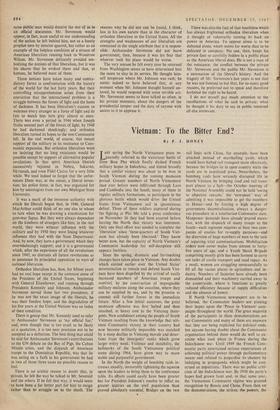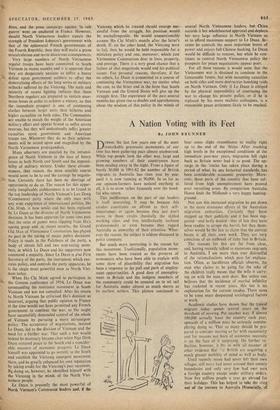Vietnam : To the Bitter End ?
By P. J. HONEY
LST spring the North Vietnamese press re- peatedly referred to the victorious battle of Dien Bien Phu which finally dashed French
military hopes in Indochina, and hinted broadly that a similar victory was about to be won in South Vietnam during the coming monsoon period. Greater numbers of North Vietnamese than ever before were infiltrated through Laos and Cambodia into the South, many of them in regular military formations, to participate in the glorious battle which would drive the United States from Vietnamese soil in ignominious defeat. Three of these soldiers captured during the fighting at Plei Me told a press conference on November 16 they had been assured before leaving the North that victory was imminent. Only one final effort was needed to complete the 'liberation' since 'three-quarters of South Viet- nam has already been liberated.' They know better now, but the capacity of North Vietnam's Communist leadership for self-deception still appears limitless.
Since the spring, dramatic and far-reaching changes have taken place in Vietnam. Any doubts which existed earlier over the United States' determination to remain and defend South Viet- . nam have been dispelled by the arrival of vastly increased numbers of American troops and materiel, by the construction of impregnable military enclaves along the coastline, where they can be supplied by sea, and by the promise to commit still further forces in the immediate future. After a few initial successes, the great monsoon offensive was first halted and then smashed, at heavy cost to the Vietcong insur- gents. New confidence among the people of South Vietnam resulting from the knowledge that ulti- mate Communist victory in their country had now become militarily impossible was matched by a steep decline in Vietcong morale and deser- tions from the insurgents' ranks which grow larger every week. Violence and instability, the hallmarks of the South Vietnamese political scene during 1964, have given way to more stable and purposeful government.
In the North the weight of bombing raids in- creases steadily, inexorably tightening the squeeze upon the leaders to bring them to the conference table. Its effects could easily have been greater but for President Johnson's resolve to inflict no greater injuries on the civil population than proved absolutely essential. Bridges on the two rail links with China, for example,. have been attacked instead of marshalling yards, which would have halted rail transport more effectively, because the bridges lie in open country while the yards are in populated areas. Nevertheless, the bombing raids have seriously disrupted life in North Vietnam by bringing road and rail trans- port almost to a 'halt—the October meeting of the National Assembly could not be held 'owing to objective reasons,' the 'newspeak' way of admitting it was impossible to get the members to Hanoi—and by forcing a high degree of government decentralisation, always a danger- ous procedure in a totalitarian Communist state. Manpower demands have already proved exces- sive, with the dispatch of many troops to the South—each regiment requires at least two com- panies of coolies for re-supply purposes—and the diversion of huge numbers of men to the task of repairing vital communications. Mobilisation orders now cover males from sixteen to forty- five years of age, and a Youth Shock Brigade comprising mostly girls has been formed to carry out tasks of coolie transport and road repair. As a result, women are struggling unsuccessfully to fill all the vacant places in agriculture and in- dustry. Numbers of factories have already been dismantled and their machinery carried away to the countryside, where it functions at greatly reduced efficiency because of supply difficulties and the absence of power.
If North Vietnamese newspapers are to be believed, the Communist leaders are pinning their hopes upon the 'Peace in Vietnam' cam- paigns throughout the world. The great majority of the participants in these demonstrations are not Communists and many of them arc unaware that they are being exploited for political ends, but anyone having doubts about the Communist Organisation behind them would do well to ex- amine what took place in France during the Indochinese war. Until 1949 the French Com- munist party entertained serious expectations of achieving political power through parliamentary means and refused to jeopardise its chances by indulging in propaganda which might be con- strued as unpatriotic. There was no public criti- cism of the Indochinese war. By 1950 the party's hopes had grown faint and, in that same year, the Vietnamese Communist r6gime was granted recognition by Russia and China. From then on the demonstrations, the strikes, the posters, the
films, and the press campaign against 'la sale guerre' went on unabated in France. However,
should North Vietnamese leaders equate the strength of President Johnson's government with that of the ephemeral French governments of the Fourth Republic, then they will make a grave miscalculation and invite disastrous consequences. Very large numbers of North Vietnamese regular troops have been committed to South Vietnam in recent months and it is apparent that they are desperately anxious to inflict a heavy defeat upon government soldiers to offset the demoralising effects of the long series of military setbacks suffered by the Vietcong. The scale and intensity of recent lighting indicate that these Northern regulars are prepared to sustain enor- mous losses in order to achieve a victory, so that the immediate prospect is one of continuing clashes between larger units than hitherto and higher casualties on both sides. The Communists are unable to match the weight of the American military effort and appear bound to suffer severe reverses, but they will undoubtedly inflict greater casualties upon government and American troops too. Whenever they do so their achieve- ments will be seized upon and magnified by the North Vietnamese propagandists.
Many observers are puzzled by the intransi- gence of North Vietnam in the face of heavy losses in both North and South and the impossi-
bility of military victory. Under these circum- stances, they reason, the most sensible course
would seem to be to end the carnage by negotia-
,f) tion. Certainly there has been no shortage of opportunity to do so. The reason for this appar-
ently inexplicable stubbornness is to be found in the top leadership of North Vietnam's Lao Dong (Communist) party where the only man with any wide experience of international politics, Ho Chi Minh, is now senile and has been replaced by Le Duan as the director of North Vietnamese destinies. It has been apparent for some time past that the reins of power were slipping from Ho's ageing grasp and, in recent months, the Grand Old Man of Vietnamese Communism has played ,
no part in the taking of major policy decisions. Policy is made in the Politburo of the party, a
body of eleven full and two non-voting mem- bers, in which Le Duan and his supporters now command a majority. Since Le Duan is also First Secretary of the party, the instrument which exe- cutes policy, and controls the party apparatus, he is the single most powerful man in North Viet- nam today.
When Ho Chi Minh agreed to participate in the Geneva conference of 1954, Le Duan was commanding the resistance movement in South Vietnam and was not consulted. After his return to North Vietnam he criticised Ho's decision as incorrect, arguing that public opinion in France at the time'would not have permitted any French government to continue the war, so Ho might have successfUlly demanded control of the whole of Vietnam by pursuing a more intransigent policy. The acceptance of negotiations, insisted Le Duan, led to the division of Vietnam and the need for a further war. That such a war would indeed be necessary became.clear when Ngo Dinh Diem restored peace to the South and a consider- able measure of economic progresS. Le Duan himself was appointed to go secretly to the South and establish the Vietcong insurgent movement there, and he greatly enhanced his own reputation
by taking credit for the Vietcong's past successes. 113i doing so, however, he identified himself with the Vietcong in the minds of the North Viet- namese people.
Le Duan is presently the most powerful of North Vietnam's Communist leaders and, if the
Vietcong which he created should emerge suc- cessful from the struggle, his position would be unchallengeable. He would unquestionably assume Ho Chi Minh's mantle after the latter's death. If, on the other hand, the Vietcong were to fail, then he would be held responsible for a mistaken policy and one, moreover, which cost Vietnamese Communism dear in lives, property, and prestige. There is a very good chance that a failure of that magnitude would end his political career. For Personal reasons, therefore, if for no others, Le Duan is committed to a course of continuing the Vietnamese war, no matter what the cost, to the bitter end in the hope that South Vietnam and the United States will give up the struggle first. The experience of the .past several months has given rise to doubts and apprehension about the wisdom of this policy in the minds of
several North Vietnamese leaders, but China accords it her wholehearted approval and deploys her very large influence in North Vietnam so as to afford maximum support to Le Duan. Be- . cause he controls the most important levers of power and enjoys full Chinese backing, Le Duan would be difficult to remove, but while he con- tinues to control North Vietnamese policy the prospects for peace negotiations appear poor.
For all these reasons it would seem that the Vietnamese war is destined to continue in the foreseeable future, but with mounting casualties on both sides and more destructive bombing raids , on North Vietnam. Only if Le Duan is obliged by the physical impossibility of continuing the war to change his present policy, or if he is replaced by his more realistic colleagues, is a reasonable peace settlement likely to be reached.































 Previous page
Previous page